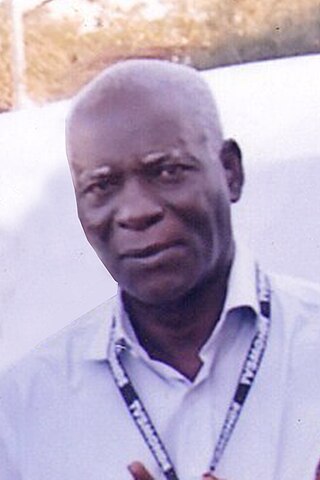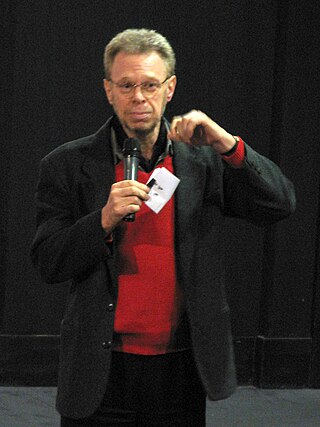Alain Resnais was a French film director and screenwriter whose career extended over more than six decades. After training as a film editor in the mid-1940s, he went on to direct a number of short films which included Night and Fog (1956), an influential documentary about the Nazi concentration camps.

The French people are a Romance ethnic group and nation primarily located in Western Europe that share a common French culture, history, and language, identified with the country of France.

Idrissa Ouédraogo was a Burkinabé filmmaker. His work often explored the conflict between rural and city life and tradition and modernity in his native Burkina Faso and elsewhere in Africa. He is best known for his feature film Tilaï, which won the Grand Prix at the 1990 Cannes Film Festival and Samba Traoré (1993), which was nominated for the Silver Bear award at the 43rd Berlin International Film Festival.

Souleymane Cissé is a Malian film director, regarded as one of the first generation of African filmmakers. He has been called "Africa's greatest living filmmaker" while his film Yeelen has been called "conceivably the greatest African film ever made."

The Panafrican Film and Television Festival of Ouagadougou is a film festival in Burkina Faso, held biennially in Ouagadougou, where the organization is based. It accepts for competition only films by African filmmakers and chiefly produced in Africa. FESPACO is scheduled in March every second year, two weeks after the last Saturday of February. Its opening night is held in the Stade du 4-Août, the national stadium.
Oumarou Ganda was a Nigerien director and actor who helped bring African cinema to international attention in the 1960s and 1970s.
The Cinema of Niger began in the 1940s with the ethnographical documentary of French director Jean Rouch, before growing to become one of the most active national film cultures in Francophone Africa in the 1960s-70s with the work of filmmakers such as Oumarou Ganda, Moustapha Alassane and Gatta Abdourahamne. The industry has slowed somewhat since the 1980s, though films continue to be made in the country, with notable directors of recent decades including Mahamane Bakabe, Inoussa Ousseini, Mariama Hima, Moustapha Diop and Rahmatou Keïta. Unlike neighbouring Nigeria, with its thriving Hausa and English-language film industries, most Nigerien films are made in French with Francophone countries as their major market, whilst action and light entertainment films from Nigeria or dubbed western films fill most Nigerien theatres.

Med Hondo was a Mauritanian-born French director, producer, screenwriter, and actor. Considered a founding father of African cinema, he is known for his controversial films dealing with issues such as race relations and colonization. His critically acclaimed 1970 directorial début feature, Soleil O, received the Golden Leopard award at the 1970 Locarno International Film Festival and was chosen in 2019 by the African Film Heritage Project for restoration. His 1979 film West Indies was the first African film musical and, at $1.3 million, the most expensive production in African film history.
Mahama Johnson Traoré (1942–2010) was a Senegalese film director, writer, and co-founder of the Ouagadougou-based Pan-African Cinema Festival (FESPACO).

Moi, un noir is a 1958 French ethnofiction film directed by Jean Rouch. The film is set in Abidjan, Ivory Coast.
Hasaki Ya Suda is a 2011 film.
Mwezé Ngangura is a film director from the Democratic Republic of the Congo (DRC).

Roger Gnoan M'Bala is an Ivorian film director. Born in Grand-Bassam, Ivory Coast, he studied history in Paris and film at the Conservatoire libre du cinéma français (CLCF) and later on in Sweden. From 1968 to 1978, he worked for the Radiodiffusion Télévision ivoirienne (RTI). before creating the 1970 black and white documentary on the traditional dance Koundoum. In 1972 he won the Silver Tanit at the Carthage Film Festival with the short Amanie and several other awards including a FIFEF. Thereafter he produced independently a short, Valisy and a medium-length satirical film, Le Chapeau. In 1984 he directed his first feature film, Ablakon. He became known thanks to his film Au nom du Christ, winning in 1993 a premio giovani at the Locarno International Film Festival and an Étalon de Yennenga at the FESPACO.

Taïeb Louhichi was a Tunisian film director, screenwriter, and filmmaker. His best known works include his debut feature film, Shadow of the Earth (1982), Layla, My Reason (1989), and La Danse du vent (2004).

Kollo Daniel Sanou is a Burkinabé film director as well as a screenwriter and producer of both fiction and documentary films.

Fadika Kramo-Lanciné is an Ivorian film director as well as a screenwriter and producer of both fiction and documentary films.

Michael Raeburn is a Zimbabwean filmmaker.
Les Bicots-nègres, vos voisins is a 1974 French-Mauritanian film, written and directed by Med Hondo.
The Central African Republic is one of the world's poorest countries and the film industry is correspondingly small. The first film made in CAR appears to have been Les enfants de la danse, a short French-made ethnographic documentary of 1945. Joseph Akouissone was the first Central African to make a film in the country, with his 1981 documentary Un homme est un homme; he was followed by the documentaries made in the 1980s by Léonie Yangba Zowe. Since then a series of ongoing conflicts and economic crises have severely limited the potential growth of film-making in the country. The first feature-length drama made in the country was Le silence de la forêt, a 2003 CAR-Gabon-Cameroon co-production about the Biaka people.
Joseph Akouissonne was a Central African film director, actor, and journalist.










